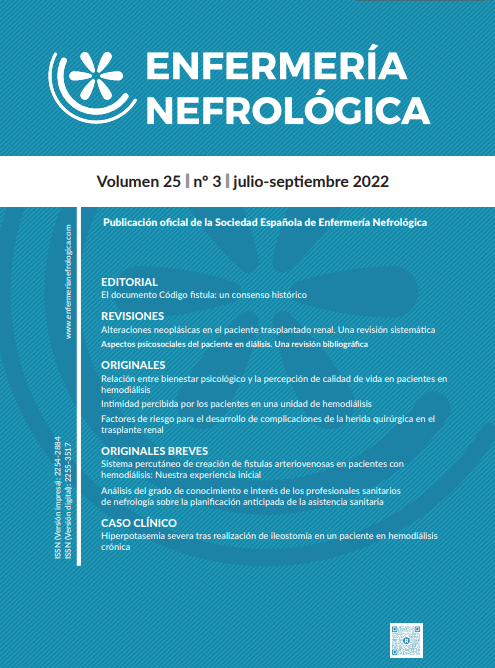Main Article Content
Abstract
Case description:
Patient admitted for anaemia and deterioration of renal function. Infiltrating rectal neoplasia was diagnosed after colonoscopy. Renal replacement therapy was started after placing a tunneled venous catheter. Prior to ileostomy, neoadjuvant radiotherapy was performed. Three months later, persistent severe hyperkalaemia appeared. Few cases have been described in the literature, but there seems to be a relationship with the interruption of intestinal transit.
Description-evaluation of the care plan:
Dietary reinforcement was performed, hemodialysis parameters were modified and treatment with resins was started, but potassium did not normalise until the ileostomy was closed. Resolving the hyperkalaemia was the main focus of the care plan, in addition to anxiety management and supporting the patient in stoma self-care. It was suggested that the alteration of homeostasis was due to a deficit of intestinal potassium secretion in the colon. The process of restoring intestinal continuity was accelerated with the closure of the ileostomy, confirming the suspicion.
Conclusion:
Hyperkalaemia in hemodialysis patients may be related to colo n surgery. Our case demonstrates the importance of potassium secretion in the intestinal tract to maintain homeostasis in patients with end-stage renal failure.
Keywords
Article Details

This work is licensed under a Creative Commons Attribution-NonCommercial 4.0 International License.
Author copyright notice
© Authors grant the publisher the non-exclusive licence to publish the work and consent to its use and distribution under the Creative Commons Attribution - NonCommercial 4.0 International (CC BY-NC 4.0) licence. Read the licensing information and the legal text here. This must be expressly stated wherever necessary.
References
- Blanco Santos A. Homeostasis del potasio. Monogr Nefrol 2019;1(1):10-20.
- Hunter RW, Bailey MA. Hyperkalemia: pathophysiology, risk factors and consequences. Nephrol Dial Transplant 2019;34(Suppl 3):iii2-iii11. DOI: https://doi.org/10.1093/ndt/gfz206
- Rodríguez P, Mérida E, Hernández E, Milla M, Praga M. Hiperpotasemia de causa no renal en paciente en hemodiálisis. Nefrología 2018;38(1):96-7. DOI: https://doi.org/10.1016/j.nefro.2017.01.005
- Kononowa N, Dickenmann MJ, Kim MJ. Severe hyperkalemia following colon diversion surgery in a patient undergoing chronic hemodialysis: a case report. J Med Case Rep 2013 14;7:207. DOI: https://doi.org/10.1186/1752-1947-7-207
- Yorimitsu D, Sasaki T, Horike H, Fueki T, Fujimoto S, Komai N, et al. Severe hyperkalemia following ileostomy not colostomy in a patient undergoing chronic hemodialysis. Kawasaki Med J 2015;41(2):65-9.
- Eskandar N, Holley JL. Hyperkalaemia as a complication of ureteroileostomy: a case report and literature review. Nephrol Dial Transplant 2008;23(6):2081-3. DOI: https://doi.org/10.1093/ndt/gfn097
- Yang K, Zhao J, Chu L, Hu M, Zhou W, Li Y et al. Temporary impairment of renal function in patients with rectal cancer treated with diverting ileostomy. J Gastrointest Oncol 2021;12(2):620-9. DOI: https://doi.org/10.21037/jgo-21-118
- Gordon M. Manual de diagnósticos enfermeros. 10ª edición. Madrid: Elsevier; 2003.
- Herdman TH, Kamitsuru S, Takáo Lopes C, Diagnósticos enfermeros. Definiciones y clasificación 2021-2023, 12ª ed. Barcelona: Elsevier; 2021.
- Moorhead S, Swanson E, Johnson M, Maas ML. Clasificación de Resultados de Enfermería (NOC): Medición de Resultados en Salud, 6ª ed. Barcelona: Elsevier; 2018.
- Butcher H, Bulechek G, Dochterman JM, Wagner C. Clasificación de Intervenciones de Enfermería (NIC), 7ª ed. Barcelona: Elsevier; 2018.
- Mathialahan T, Maclennan KA, Sandle LN, Verbeke C, Sandle GI. Enhanced large intestinal potassium permeability in end-stage renal disease. J Pathol 2005;206(1):46-51. DOI: https://doi.org/10.1002/path.1750
- Sorensen MV, Matos JE, Praetorius HA, Leipziger J. Colonic potassium handling. Pflugers Arch. 2010;459(5):645-56. DOI: https://doi.org/10.1007/s00424-009-0781-9
- Hayes CP Jr, McLeod ME, Robinson RR. An extravenal mechanism for the maintenance of potassium balance in severe chronic renal failure. Trans Assoc Am Physicians 1967;80:207-16.
- Mathialahan T, Sandle GI. Dietary potassium and laxatives as regulators of colonic potassium secretion in end-stage renal disease. Nephrol Dial Transplant 2003;18(2):341-7. DOI: https://doi.org/10.1093/ndt/18.2.341
References
Blanco Santos A. Homeostasis del potasio. Monogr Nefrol 2019;1(1):10-20.
Hunter RW, Bailey MA. Hyperkalemia: pathophysiology, risk factors and consequences. Nephrol Dial Transplant 2019;34(Suppl 3):iii2-iii11. DOI: https://doi.org/10.1093/ndt/gfz206
Rodríguez P, Mérida E, Hernández E, Milla M, Praga M. Hiperpotasemia de causa no renal en paciente en hemodiálisis. Nefrología 2018;38(1):96-7. DOI: https://doi.org/10.1016/j.nefro.2017.01.005
Kononowa N, Dickenmann MJ, Kim MJ. Severe hyperkalemia following colon diversion surgery in a patient undergoing chronic hemodialysis: a case report. J Med Case Rep 2013 14;7:207. DOI: https://doi.org/10.1186/1752-1947-7-207
Yorimitsu D, Sasaki T, Horike H, Fueki T, Fujimoto S, Komai N, et al. Severe hyperkalemia following ileostomy not colostomy in a patient undergoing chronic hemodialysis. Kawasaki Med J 2015;41(2):65-9.
Eskandar N, Holley JL. Hyperkalaemia as a complication of ureteroileostomy: a case report and literature review. Nephrol Dial Transplant 2008;23(6):2081-3. DOI: https://doi.org/10.1093/ndt/gfn097
Yang K, Zhao J, Chu L, Hu M, Zhou W, Li Y et al. Temporary impairment of renal function in patients with rectal cancer treated with diverting ileostomy. J Gastrointest Oncol 2021;12(2):620-9. DOI: https://doi.org/10.21037/jgo-21-118
Gordon M. Manual de diagnósticos enfermeros. 10ª edición. Madrid: Elsevier; 2003.
Herdman TH, Kamitsuru S, Takáo Lopes C, Diagnósticos enfermeros. Definiciones y clasificación 2021-2023, 12ª ed. Barcelona: Elsevier; 2021.
Moorhead S, Swanson E, Johnson M, Maas ML. Clasificación de Resultados de Enfermería (NOC): Medición de Resultados en Salud, 6ª ed. Barcelona: Elsevier; 2018.
Butcher H, Bulechek G, Dochterman JM, Wagner C. Clasificación de Intervenciones de Enfermería (NIC), 7ª ed. Barcelona: Elsevier; 2018.
Mathialahan T, Maclennan KA, Sandle LN, Verbeke C, Sandle GI. Enhanced large intestinal potassium permeability in end-stage renal disease. J Pathol 2005;206(1):46-51. DOI: https://doi.org/10.1002/path.1750
Sorensen MV, Matos JE, Praetorius HA, Leipziger J. Colonic potassium handling. Pflugers Arch. 2010;459(5):645-56. DOI: https://doi.org/10.1007/s00424-009-0781-9
Hayes CP Jr, McLeod ME, Robinson RR. An extravenal mechanism for the maintenance of potassium balance in severe chronic renal failure. Trans Assoc Am Physicians 1967;80:207-16.
Mathialahan T, Sandle GI. Dietary potassium and laxatives as regulators of colonic potassium secretion in end-stage renal disease. Nephrol Dial Transplant 2003;18(2):341-7. DOI: https://doi.org/10.1093/ndt/18.2.341




